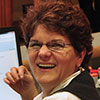This article is more than 5 years old.
My conference experience revolved around two specific foci. I was recently elected as a member-at-large of SustainRT, the Sustainability Round Table of ALA. My duties with this group include arranging programming for our sessions at ALA Annual, so I did a bit of networking to identify topics and speakers that might be of interest at all of the sustainability related sessions I attended. The second focus was to attend as many sessions on Diversity and Inclusion as I could. Both of these challenges were well met at the conference.
I attended Rebekka Smith-Aldrich’s excellent session on “Sustainable Thinking”. She identified sustainability as the things that satisfy the “triple bottom line”: environmentally sound, economically feasible, socially responsible. Her message was that libraries of all types need to identify the ways they can bring value to their institutions or communities by asking questions of constituents like:
- what kind of community do you want to live in
- why is that important to you
- how is it different from what you see now
- what are some things that should happen to create that kind of change
Armed with this information from communities, libraries are equipped to step into the gap to fill that identified need. While her message was really focused on public libraries, there is a great deal of sense in utilizing this technique to position ZSR in the forefront of change on this campus. She also did a great job of aligning the ALA Core Values into the sustainability work libraries are doing. 
I attended a very helpful workshop entitled Pathways to Diversity and Inclusion: Perspectives on Leadership, Development, and Practices. The panel consisted of three speakers, all women of color, who are leaders in their respective libraries. Yolanda Cooper, University Librarian, Emory University, Meredith Evans, Director, Jimmy Carter Presidential Library and Museum, and Loretta Parham, CEO and Director, Atlanta University Center, Robert W. Woodruff Library. While all three had different paths to leadership in the profession, similarities in their experience included finding mentors early in their career who nurtured them, and then maintaining an ongoing commitment to expanding diversity in librarianship. Yoland Cooper said that she had a stint in HR and utilized that time to make some changes in recruitment including mandating that underrepresented groups were hired for open positions. Simultaneous to hiring more diverse candidates, having a welcoming and supportive environment is also critical to ensuring they stay, so checking in with new hires to be sure that they are settling in well is important for a successful program. Resources for those who need to find their place in this landscape include the HBCU Library Alliance, a place to caucus and build a network.
The one place that enabled my sustainability and my diversity and inclusion paths to cross is that I was honored to be the representative of the SustainRT board for the Martin Luther King Jr. Holiday Observance and Sunrise Ceremony. Each of the participants from every round table got a chance to read some of Dr. King’s letter from a Birmingham Jail aloud to the more than 300 attendees who gathered very early on Monday morning. They keynote speaker, Dr. Daina Ramey Berry, is a specialist in the history of gender and slavery in the United States with a particular emphasis on the social and economic history of the nineteenth century, and is Associate Professor of History and African and African Diaspora Studies and the Oliver H. Radkey Regents Fellow in History at the University of Texas at Austin. After the service, (where we sang “Lift Every Voice and Sing” at the start and “We Shall Overcome” at the end, both of which I knew well and could sing in all my full-throated capacity, knowing Carol and Travis would be proud) she did a book signing of The Price for their Pound of Flesh: The Value of the Enslaved, from the Womb to the Grave, in the Building of a Nation. It was the best giveaway of the conference. The work offers a groundbreaking look at slaves in early America, seeing them as commodities through every phase of life. It is sobering work.
As a back drop to all of this of course was the March that took place a block from the conference center on Saturday, and the Falcon’s football game across the street on Sunday.  I also saw my fair share of cool things on the vendor floor.
I also saw my fair share of cool things on the vendor floor.

 It was a different sort of ALA midwinter meeting than I’ve ever attended before.
It was a different sort of ALA midwinter meeting than I’ve ever attended before.

4 Comments on ‘MBL’s at ALAMW in Atlanta’
Great post and pics, Mary Beth! I really like the definitions of regenerative, resilient, and sustainable! The MLK Jr. holiday observance and sunrise ceremony sounded excellent!
Wish I had known about the sunrise service, it sounded wonderful.
Sounds like a thought-provoking Midwinter! Btw, I want one of those booth/cubby things!!
I welcome ZSR leading the way in sustainable practices! Thank you for sharing all your experiences and thoughts with us!